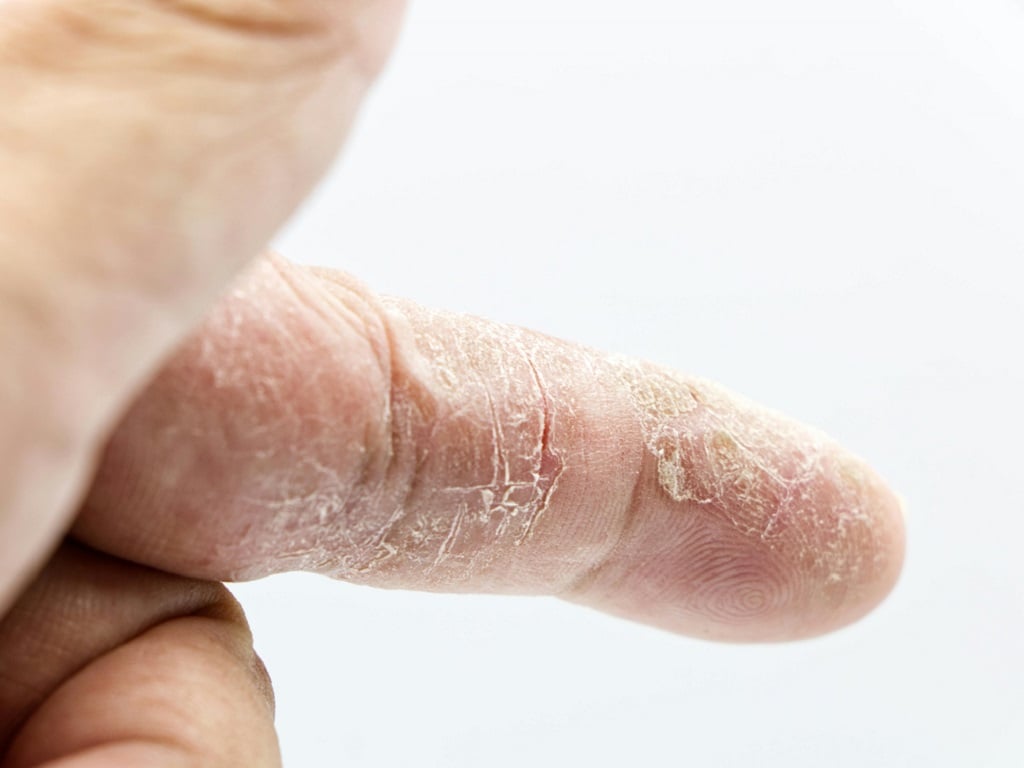The thyroid is a butterfly-shaped gland in the neck, whose main function is to secrete hormones that help maintain the body's metabolism. In particular, thyroid hormones such as T3 and thyroxine will affect the process of using energy throughout the body, helping to control body temperature and heart rate, according to the health website Medical News Today (UK).

Dry skin is one of the common symptoms of hypothyroidism.
When hypothyroidism occurs, the body will show the following symptoms:
Weight gain
Hypothyroidism can cause rapid weight gain. This is because the thyroid gland does not secrete enough of the hormone thyroxine to maintain metabolism. The slowing metabolism reduces the body's ability to burn calories. This results in a calorie surplus and weight gain.
Appearance change
Low thyroid hormone levels can also cause hair loss, dry, red, itchy, thin, and easily irritated skin. Swelling can also occur in the joints, face, neck, or legs.
These symptoms can easily be mistaken for common health problems. However, if several of these symptoms appear at the same time, you should see a doctor for diagnosis and treatment.
body extremely tired
Hypothyroidism can cause extreme fatigue. This is a constant and persistent feeling, even when the person is not doing any strenuous work. In some cases, this feeling of fatigue can be mistaken for overwork or stress. .
Amenorrhea
In women, the thyroid affects the menstrual cycle and fertility. A lack of the hormone thyroxine secreted by the thyroid gland makes it difficult for ovulation to occur, thereby reducing fertility. Women with hypothyroidism are also at higher risk of certain pregnancy problems such as preeclampsia and miscarriage.
People with hypothyroidism need to be diagnosed and treated promptly. If left untreated, the patient will develop goiter, difficulty breathing, some psychological disorders, cardiovascular disorders and some other complications. The patient may even develop myxedema coma. This is a serious complication of hypothyroidism, leading to coma and can be life-threatening, according to Medical News Today .
Source link



![[Photo] Ready for the top competitions of Vietnamese table tennis](https://vphoto.vietnam.vn/thumb/1200x675/vietnam/resource/IMAGE/2025/5/18/9c547c497c5a4ade8f98c8e7d44f5a41)
![[Photo] Many young people patiently lined up under the hot sun to receive a special supplement from Nhan Dan Newspaper.](https://vphoto.vietnam.vn/thumb/1200x675/vietnam/resource/IMAGE/2025/5/18/6f19d322f9364f0ebb6fbfe9377842d3)


![[Photo] Party and State leaders attend the special art program "You are Ho Chi Minh"](https://vphoto.vietnam.vn/thumb/1200x675/vietnam/resource/IMAGE/2025/5/18/6895913f94fd4c51aa4564ab14c3f250)



























































































Comment (0)